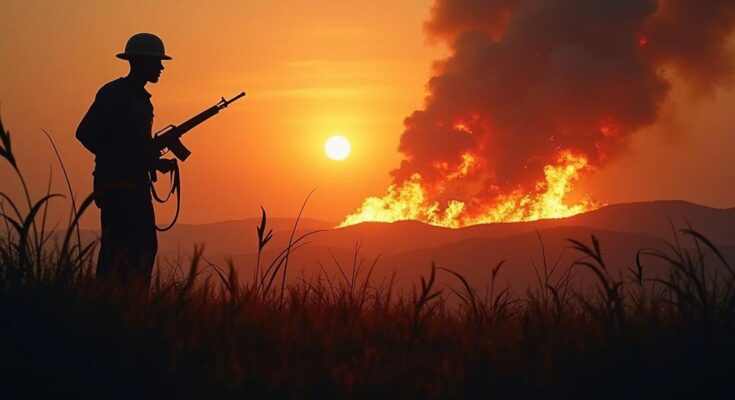The Democratic Republic of the Congo is undergoing a severe humanitarian crisis, affecting over 25 million people, escalated by ongoing conflict, mass displacements, and health emergencies such as Mpox. The situation has resulted in significant food shortages, with projections of increased child malnutrition. Efforts to address these challenges are hindered by substantial underfunding and deteriorating security conditions following the withdrawal of international peacekeeping forces.
The Democratic Republic of the Congo (DRC) faces a severe humanitarian crisis, affecting at least 25 million individuals, according to a report by the World Health Organization (WHO). This crisis has been exacerbated by ongoing conflict in the eastern region, which has persisted for decades, resulting in loathsome violence, mass displacements, and rampant disease. Dr. Adelheid Marschang, Senior Emergency Officer at WHO, noted that the DRC currently has the highest number of people in need of humanitarian assistance in the world, with 25.4 million affected by various hardships that put many in a state of chronic or acute shock. Recent violent escalations, particularly fueled by the separationist M23 movement’s offensive since 2022, have forced 7.4 million people to flee, straining already scarce resources. Dr. Marschang highlighted that nearly 40 percent of the DRC’s population, or 40.8 million individuals, are now experiencing serious food shortages. If immediate measures are not taken, it is predicted that over one million children face acute malnutrition. Compounding these dire circumstances are multiple health threats, including outbreaks of cholera, measles, and Mpox, the latter recognized as a critical global health concern. As of this year, the DRC has reported approximately 11,000 cases of Mpox, including 443 fatalities, predominantly impacting children. The nature of Mpox transmission—through close contact—poses significant risks in overcrowded displacement camps, especially given the complexities introduced by heightened military activities in the regions involved. Further complicating efforts to respond to this crisis is the substantial underfunding of humanitarian efforts, with only 16 percent of the 2024 Humanitarian Response Plan currently funded. The WHO requires approximately $30 million to manage the ongoing situation through the end of the year. The withdrawal of the UN Stabilization Mission in DRC (MONUSCO) has further deteriorated security conditions, indicating the pressing need for renewed focus on humanitarian assistance and conflict resolution in the region.
The ongoing humanitarian crisis in the Democratic Republic of the Congo draws attention due to its multifaceted nature characterized by prolonged conflicts exacerbated by health emergencies. The eastern region of the DRC has a history of violence fueled by resource-rich environments and separatist movements such as the M23. Such conflicts have perpetuated cycles of displacement and health crises, leading to widespread food insecurity and disease outbreaks. The recent focus on Mpox, amongst other health challenges, highlights the acute healthcare needs amidst a backdrop of violent instability and insufficient humanitarian funding. Furthermore, the transition of responsibility from international peacekeeping forces to local governance introduces uncertainties that may undermine efforts to stabilize the region.
The humanitarian situation in the Democratic Republic of the Congo remains dire, with millions in need of assistance due to ongoing conflict and health emergencies. The alarming statistics regarding displacement, food insecurity, and health threats such as Mpox underscore the urgency of action. The international community’s response, impeded by funding shortfalls and security challenges, emphasizes the critical need for sustained support and intervention to provide relief and stability in the DRC.
Original Source: news.un.org




